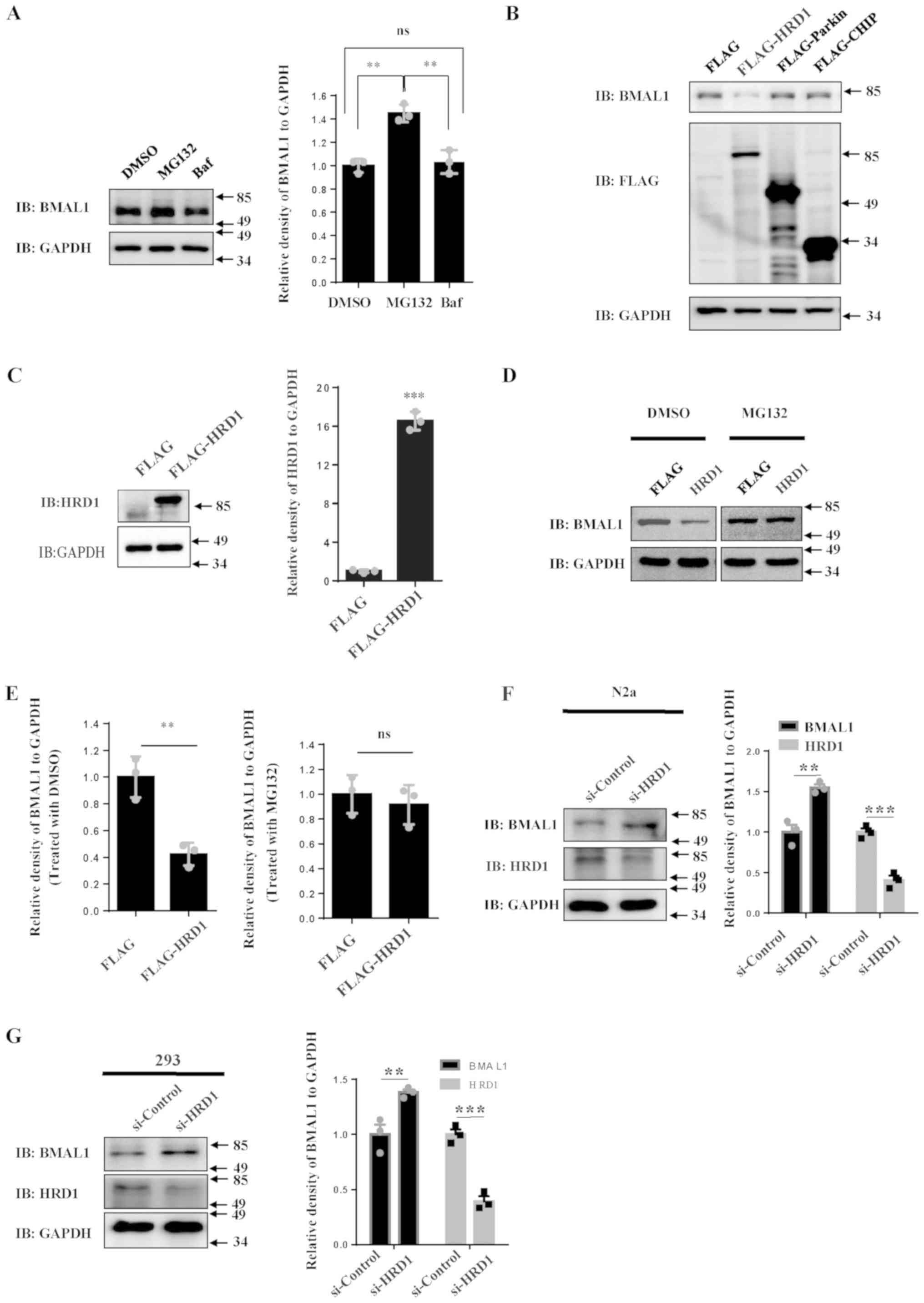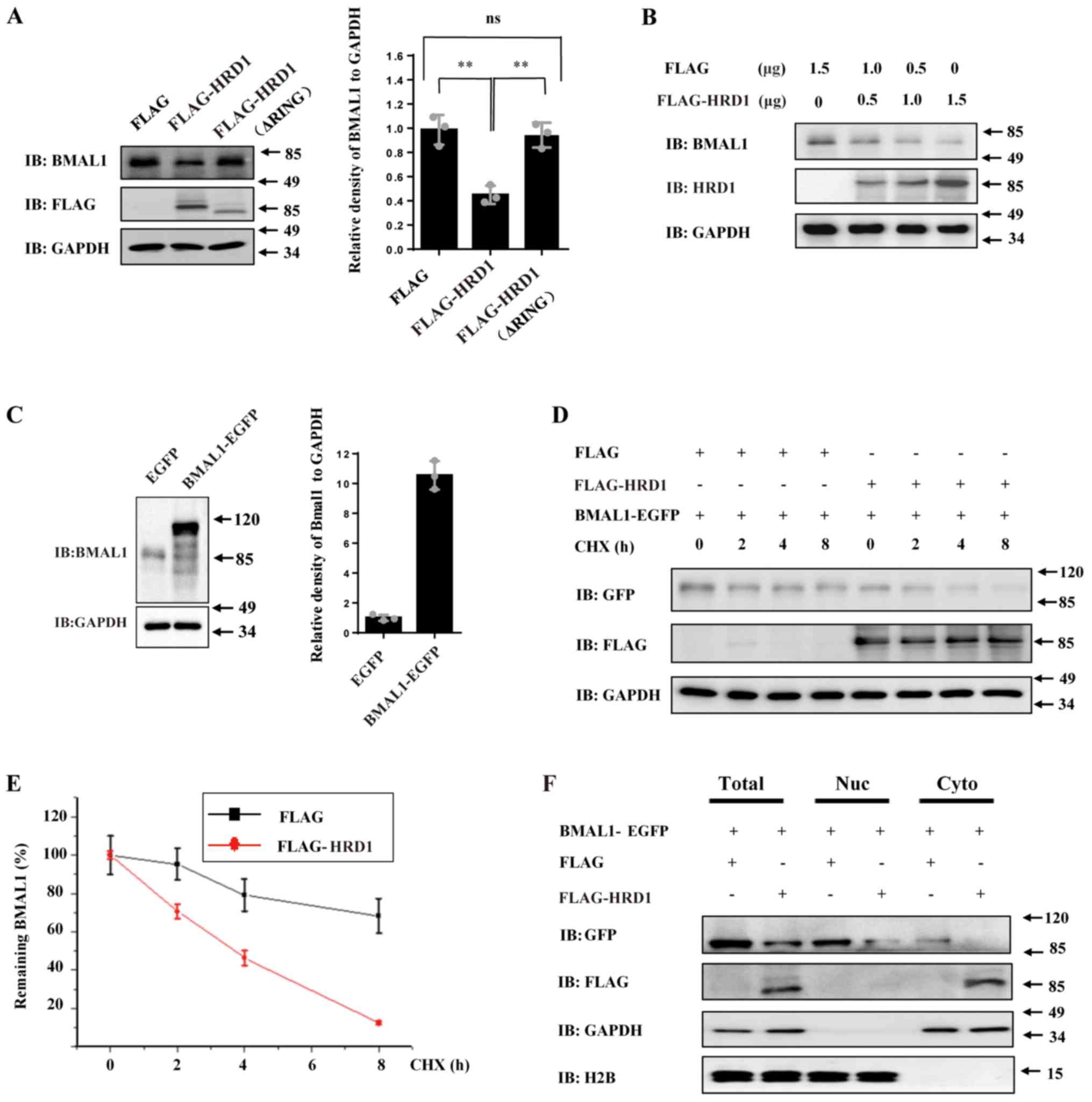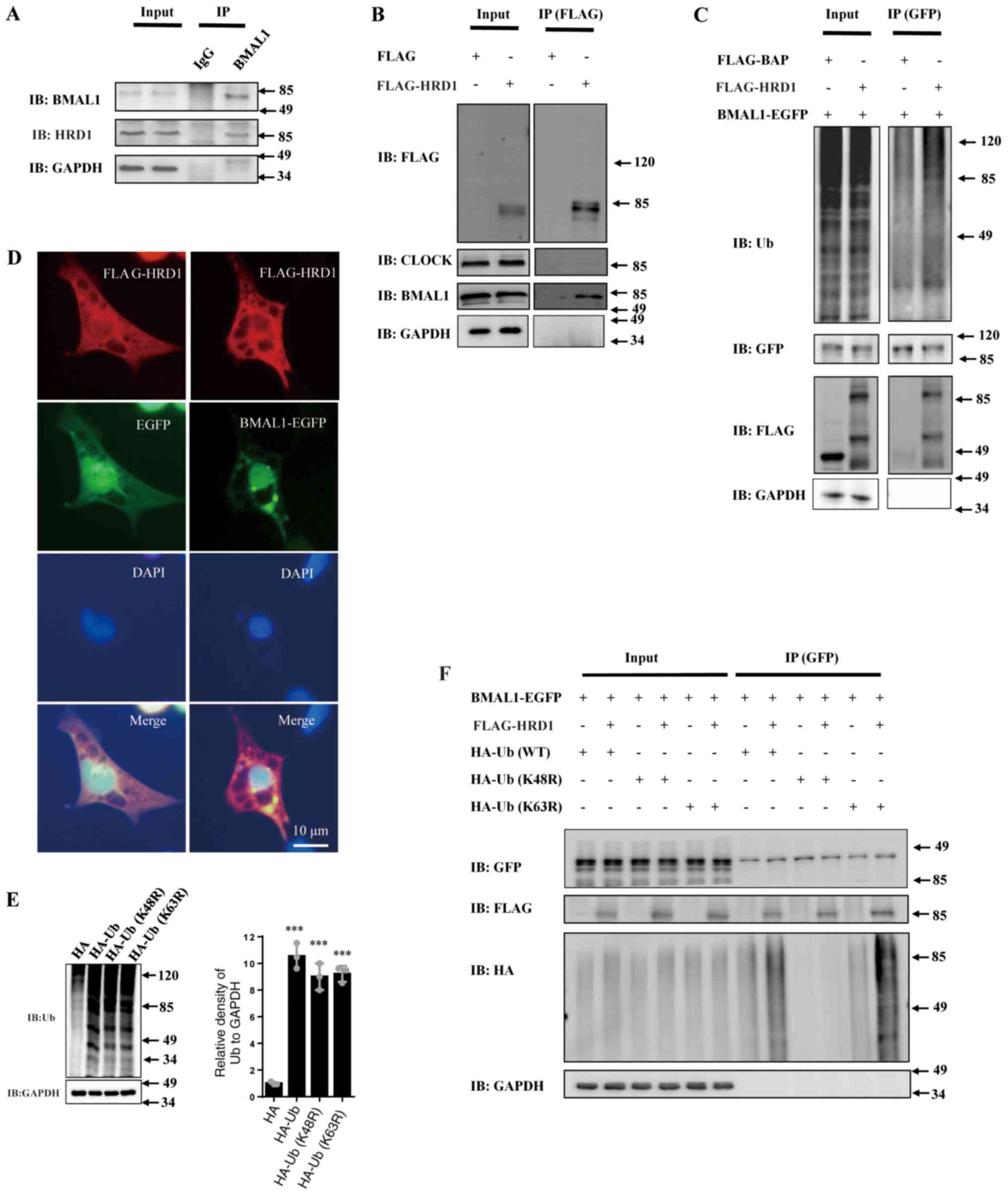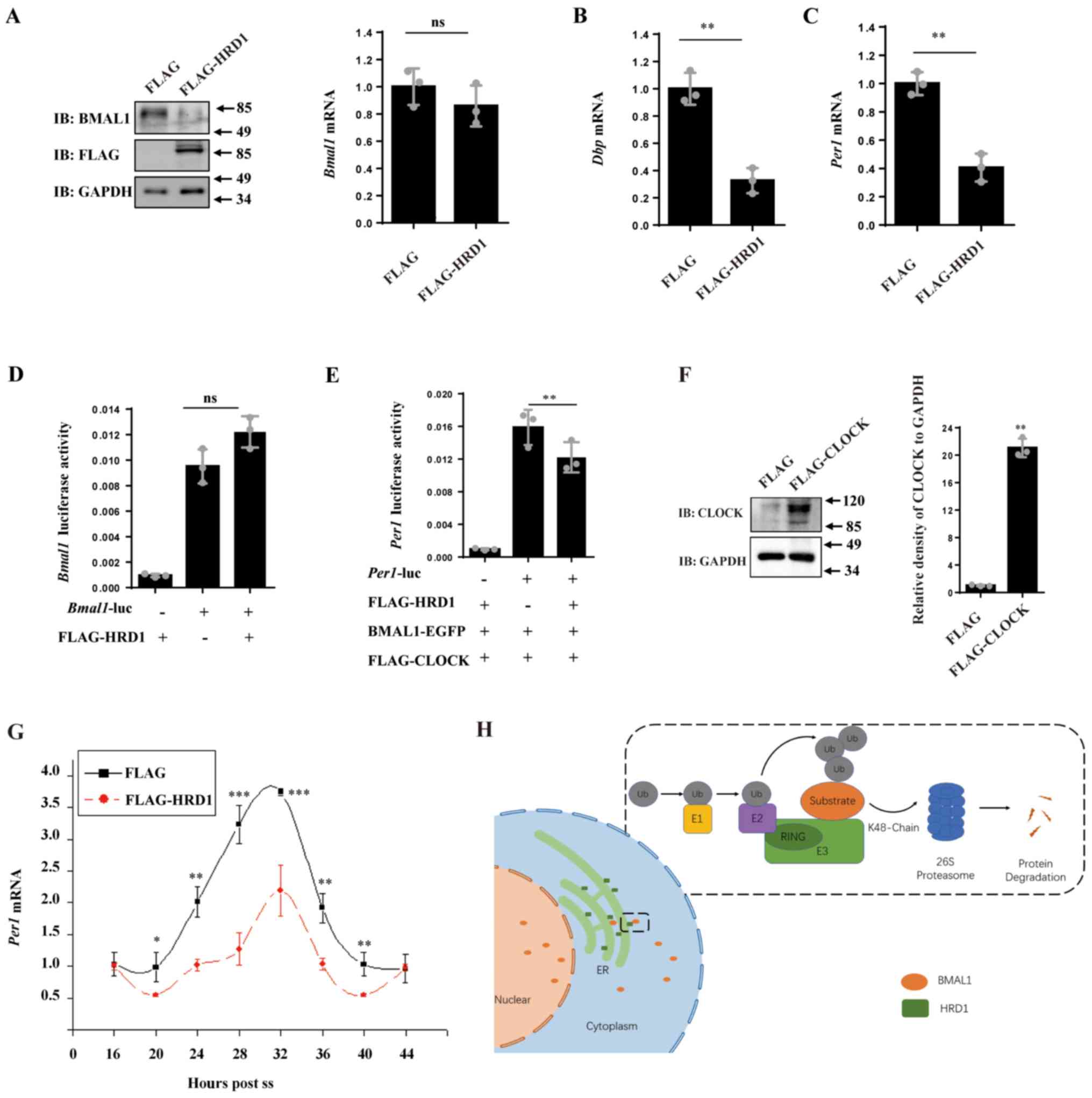|
1
|
Cao Y and Wang RH: Associations among
metabolism, circadian rhythm and age-associated diseases. Aging
Dis. 8:314–333. 2017.PubMed/NCBI View Article : Google Scholar
|
|
2
|
Mitsumoto Y and Mori A: Acute restraint
stress augments 1-Methyl-4-phenyl-1,2,3,6-tetrahydropyridine
neurotoxicity via increased toxin uptake into the brain in C57BL/6
mice. Neurosci Bull. 34:849–853. 2018.PubMed/NCBI View Article : Google Scholar
|
|
3
|
Li X and Li X: The antidepressant effect
of light therapy from retinal projections. Neurosci Bull.
34:359–368. 2018.PubMed/NCBI View Article : Google Scholar
|
|
4
|
Poggiogalle E, Jamshed H and Peterson CM:
Circadian regulation of glucose, lipid, and energy metabolism in
humans. Metabolism. 84:11–27. 2018.PubMed/NCBI View Article : Google Scholar
|
|
5
|
Brown SA: Circadian metabolism: From
mechanisms to metabolomics and medicine. Trends Endocrinol Metab.
27:415–426. 2016.PubMed/NCBI View Article : Google Scholar
|
|
6
|
Mendoza-Viveros L, Bouchard-Cannon P,
Hegazi S, Cheng AH, Pastore S and Cheng HM: Molecular modulators of
the circadian clock: Lessons from flies and mice. Cell Mol Life
Sci. 74:1035–1059. 2017.PubMed/NCBI View Article : Google Scholar
|
|
7
|
Papazyan R, Zhang Y and Lazar MA: Genetic
and epigenomic mechanisms of mammalian circadian transcription. Nat
Struct Mol Biol. 23:1045–1052. 2016.PubMed/NCBI View Article : Google Scholar
|
|
8
|
Chen D, Li YP, Yu YX, Zhou T, Liu C, Fei
EK, Gao F, Mu CC, Ren HG and Wang GH: Dendritic cell nuclear
protein-1 regulates melatonin biosynthesis by binding to BMAL1 and
inhibiting the transcription of N-acetyltransferase in C6 cells.
Acta Pharmacol Sin. 39:597–606. 2018.PubMed/NCBI View Article : Google Scholar
|
|
9
|
Lim C and Allada R: Emerging roles for
post-transcriptional regulation in circadian clocks. Nat Neurosci.
16:1544–1550. 2013.PubMed/NCBI View
Article : Google Scholar
|
|
10
|
Preußner M and Heyd F:
Post-transcriptional control of the mammalian circadian clock:
Implications for health and disease. Pflugers Arch. 468:983–991.
2016.PubMed/NCBI View Article : Google Scholar
|
|
11
|
Beckwith EJ and Yanovsky MJ: Circadian
regulation of gene expression: At the crossroads of transcriptional
and post-transcriptional regulatory networks. Curr Opin Genet Dev.
27:35–42. 2014.PubMed/NCBI View Article : Google Scholar
|
|
12
|
Swatek KN and Komander D: Ubiquitin
modifications. Cell Res. 26:399–422. 2016.PubMed/NCBI View Article : Google Scholar
|
|
13
|
Covill-Cooke C, Howden JH, Birsa N and
Kittler JT: Ubiquitination at the mitochondria in neuronal health
and disease. Neurochem Int. 117:55–64. 2018.PubMed/NCBI View Article : Google Scholar
|
|
14
|
Rape M: Ubiquitylation at the crossroads
of development and disease. Nat Rev Mol Cell Biol. 19:59–70.
2018.PubMed/NCBI View Article : Google Scholar
|
|
15
|
Lecker SH, Goldberg AL and Mitch WE:
Protein degradation by the ubiquitin-proteasome pathway in normal
and disease states. J Am Soc Nephrol. 17:1807–1819. 2006.PubMed/NCBI View Article : Google Scholar
|
|
16
|
Myung J, Kim KB and Crews CM: The
ubiquitin-proteasome pathway and proteasome inhibitors. Med Res
Rev. 21:245–273. 2001.PubMed/NCBI View
Article : Google Scholar
|
|
17
|
Stojkovic K, Wing SS and Cermakian N: A
central role for ubiquitination within a circadian clock protein
modification code. Front Mol Neurosci. 7(69)2014.PubMed/NCBI View Article : Google Scholar
|
|
18
|
Busino L, Bassermann F, Maiolica A, Lee C,
Nolan PM, Godinho SI, Draetta GF and Pagano M: SCFFbxl3 controls
the oscillation of the circadian clock by directing the degradation
of cryptochrome proteins. Science. 316:900–904. 2007.PubMed/NCBI View Article : Google Scholar
|
|
19
|
Xing W, Busino L, Hinds TR, Marionni ST,
Saifee NH, Bush MF, Pagano M and Zheng N: SCF(FBXL3) ubiquitin
ligase targets cryptochromes at their cofactor pocket. Nature.
496:64–68. 2013.PubMed/NCBI View Article : Google Scholar
|
|
20
|
Yoo SH, Mohawk JA, Siepka SM, Shan Y, Huh
SK, Hong HK, Kornblum I, Kumar V, Koike N, Xu M, et al: Competing
E3 ubiquitin ligases govern circadian periodicity by degradation of
CRY in nucleus and cytoplasm. Cell. 152:1091–1105. 2013.PubMed/NCBI View Article : Google Scholar
|
|
21
|
Cho H, Zhao X, Hatori M, Yu RT, Barish GD,
Lam MT, Chong LW, DiTacchio L, Atkins AR, Glass CK, et al:
Regulation of circadian behaviour and metabolism by REV-ERB-α and
REV-ERB-β. Nature. 485:123–127. 2012.PubMed/NCBI View Article : Google Scholar
|
|
22
|
Zhang Y, Fang B, Emmett MJ, Damle M, Sun
Z, Feng D, Armour SM, Remsberg JR, Jager J, Soccio RE, et al: GENE
REGULATION Discrete functions of nuclear receptor Rev-erbα couple
metabolism to the clock. Science. 348:1488–1492. 2015.PubMed/NCBI View Article : Google Scholar
|
|
23
|
Preitner N, Damiola F, Lopez-Molina L,
Zakany J, Duboule D, Albrecht U and Schibler U: The orphan nuclear
receptor REV-ERBalpha controls circadian transcription within the
positive limb of the mammalian circadian oscillator. Cell.
110:251–260. 2002.PubMed/NCBI View Article : Google Scholar
|
|
24
|
Yin L, Joshi S, Wu N, Tong X and Lazar MA:
E3 ligases Arf-bp1 and Pam mediate lithium-stimulated degradation
of the circadian heme receptor Rev-erb alpha. Proc Natl Acad Sci
USA. 107:11614–11619. 2010.PubMed/NCBI View Article : Google Scholar
|
|
25
|
Gossan NC, Zhang F, Guo B, Jin D,
Yoshitane H, Yao A, Glossop N, Zhang YQ, Fukada Y and Meng QJ: The
E3 ubiquitin ligase UBE3A is an integral component of the molecular
circadian clock through regulating the BMAL1 transcription factor.
Nucleic Acids Res. 42:5765–5775. 2014.PubMed/NCBI View Article : Google Scholar
|
|
26
|
Bordallo J, Plemper RK, Finger A and Wolf
DH: Der3p/Hrd1p is required for endoplasmic reticulum-associated
degradation of misfolded lumenal and integral membrane proteins.
Mol Biol Cell. 9:209–222. 1998.PubMed/NCBI View Article : Google Scholar
|
|
27
|
Kaneko M, Ishiguro M, Niinuma Y, Uesugi M
and Nomura Y: Human HRD1 protects against ER stress-induced
apoptosis through ER-associated degradation. FEBS Lett.
532:147–152. 2002.PubMed/NCBI View Article : Google Scholar
|
|
28
|
Kikkert M, Doolman R, Dai M, Avner R,
Hassink G, van Voorden S, Thanedar S, Roitelman J, Chau V and
Wiertz E: Human HRD1 is an E3 ubiquitin ligase involved in
degradation of proteins from the endoplasmic reticulum. J Biol
Chem. 279:3525–3534. 2004.PubMed/NCBI View Article : Google Scholar
|
|
29
|
Nomura J, Hosoi T, Kaneko M, Ozawa K,
Nishi A and Nomura Y: Neuroprotection by endoplasmic reticulum
stress-induced HRD1 and chaperones: Possible therapeutic targets
for Alzheimer's and Parkinson's disease. Med Sci (Basel).
4(14)2016.PubMed/NCBI View Article : Google Scholar
|
|
30
|
Mao J, Xia Q, Liu C, Ying Z, Wang H and
Wang G: A critical role of Hrd1 in the regulation of optineurin
degradation and aggresome formation. Hum Mol Genet. 26:1877–1889.
2017.PubMed/NCBI View Article : Google Scholar
|
|
31
|
Guo DK, Zhu Y, Sun HY, Xu XY, Zhang S, Hao
ZB, Wang GH, Mu CC and Ren HG: Pharmacological activation of
REV-ERBα represses LPS-induced microglial activation through the
NF-κB pathway. Acta Pharmacologica Sinica. 40:26–34.
2019.PubMed/NCBI View Article : Google Scholar
|
|
32
|
Livak KJ and Schmittgen TD: Analysis of
relative gene expression data using real-time quantitative PCR and
the 2(-Delta Delta C(T)) method. Methods. 25:402–408.
2001.PubMed/NCBI View Article : Google Scholar
|
|
33
|
Repouskou A, Sourlingas TG,
Sekeri-Pataryas KE and Prombona A: The circadian expression of
c-MYC is modulated by the histone deacetylase inhibitor
trichostatin A in synchronized murine neuroblastoma cells.
Chronobiol Int. 27:722–741. 2010.PubMed/NCBI View Article : Google Scholar
|
|
34
|
Chang HC and Guarente L: SIRT1 mediates
central circadian control in the SCN by a mechanism that decays
with aging. Cell. 153:1448–1460. 2013.PubMed/NCBI View Article : Google Scholar
|
|
35
|
Chilov D, Hofer T, Bauer C, Wenger RH and
Gassmann M: Hypoxia affects expression of circadian genes PER1 and
CLOCK in mouse brain. FASEB J. 15:2613–2622. 2001.PubMed/NCBI View Article : Google Scholar
|
|
36
|
Buhr ED and Takahashi JS: Molecular
components of the mammalian circadian clock. Handb Exp Pharmacol.
3–27. 2013.PubMed/NCBI View Article : Google Scholar
|
|
37
|
Musiek ES and Holtzman DM: Mechanisms
linking circadian clocks, sleep, and neurodegeneration. Science.
354:1004–1008. 2016.PubMed/NCBI View Article : Google Scholar
|
|
38
|
Chen S, Yang J, Zhang Y, Duan C, Liu Q,
Huang Z, Xu Y, Zhou L and Xu G: Ubiquitin-conjugating enzyme UBE2O
regulates cellular clock function by promoting the degradation of
the transcription factor BMAL1. J Biol Chem. 293:11296–11309.
2018.PubMed/NCBI View Article : Google Scholar
|
|
39
|
Chen S, Yang J, Yang L, Zhang Y, Zhou L,
Liu Q, Duan C, Mieres CA, Zhou G and Xu G: Ubiquitin ligase TRAF2
attenuates the transcriptional activity of the core clock protein
BMAL1 and affects the maximal Per1 mRNA level of the circadian
clock in cells. FEBS J. 285:2987–3001. 2018.PubMed/NCBI View Article : Google Scholar
|
|
40
|
Zhang Y, Duan C, Yang J, Chen S, Liu Q,
Zhou L, Huang Z, Xu Y and Xu G: Deubiquitinating enzyme USP9X
regulates cellular clock function by modulating the ubiquitination
and degradation of a core circadian protein BMAL1. Biochem J.
475:1507–1522. 2018.PubMed/NCBI View Article : Google Scholar
|
|
41
|
Lee Y, Lee J, Kwon I, Nakajima Y, Ohmiya
Y, Son GH, Lee KH and Kim K: Coactivation of the CLOCK-BMAL1
complex by CBP mediates resetting of the circadian clock. J Cell
Sci. 123:3547–3557. 2010.PubMed/NCBI View Article : Google Scholar
|
|
42
|
Kondratov RV, Chernov MV, Kondratova AA,
Gorbacheva VY, Gudkov AV and Antoch MP: BMAL1-dependent circadian
oscillation of nuclear CLOCK: Posttranslational events induced by
dimerization of transcriptional activators of the mammalian clock
system. Genes Dev. 17:1921–1932. 2003.PubMed/NCBI View Article : Google Scholar
|
|
43
|
Kwon I, Lee J, Chang SH, Jung NC, Lee BJ,
Son GH, Kim K and Lee KH: BMAL1 shuttling controls transactivation
and degradation of the CLOCK/BMAL1 heterodimer. Mol Cell Biol.
26:7318–7330. 2006.PubMed/NCBI View Article : Google Scholar
|
|
44
|
Miki T, Zhao Z and Lee CC: Interactive
organization of the circadian core regulators PER2, BMAL1, CLOCK
and PML. Sci Rep. 6(29174)2016.PubMed/NCBI View Article : Google Scholar
|
|
45
|
Lipton JO, Yuan ED, Boyle LM,
Ebrahimi-Fakhari D, Kwiatkowski E, Nathan A, Güttler T, Davis F,
Asara JM and Sahin M: The circadian protein BMAL1 regulates
translation in response to S6K1-mediated phosphorylation. Cell.
161:1138–1151. 2015.PubMed/NCBI View Article : Google Scholar
|
|
46
|
Behrends C and Harper JW: Constructing and
decoding unconventional ubiquitin chains. Nat Struct Mol Biol.
18:520–528. 2011.PubMed/NCBI View Article : Google Scholar
|
|
47
|
Hochstrasser M: Lingering mysteries of
ubiquitin-chain assembly. Cell. 124:27–34. 2006.PubMed/NCBI View Article : Google Scholar
|


















